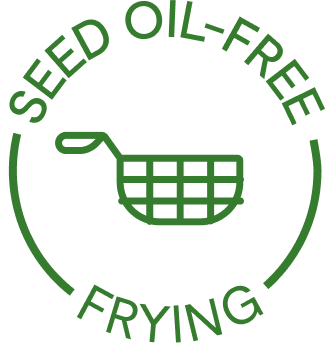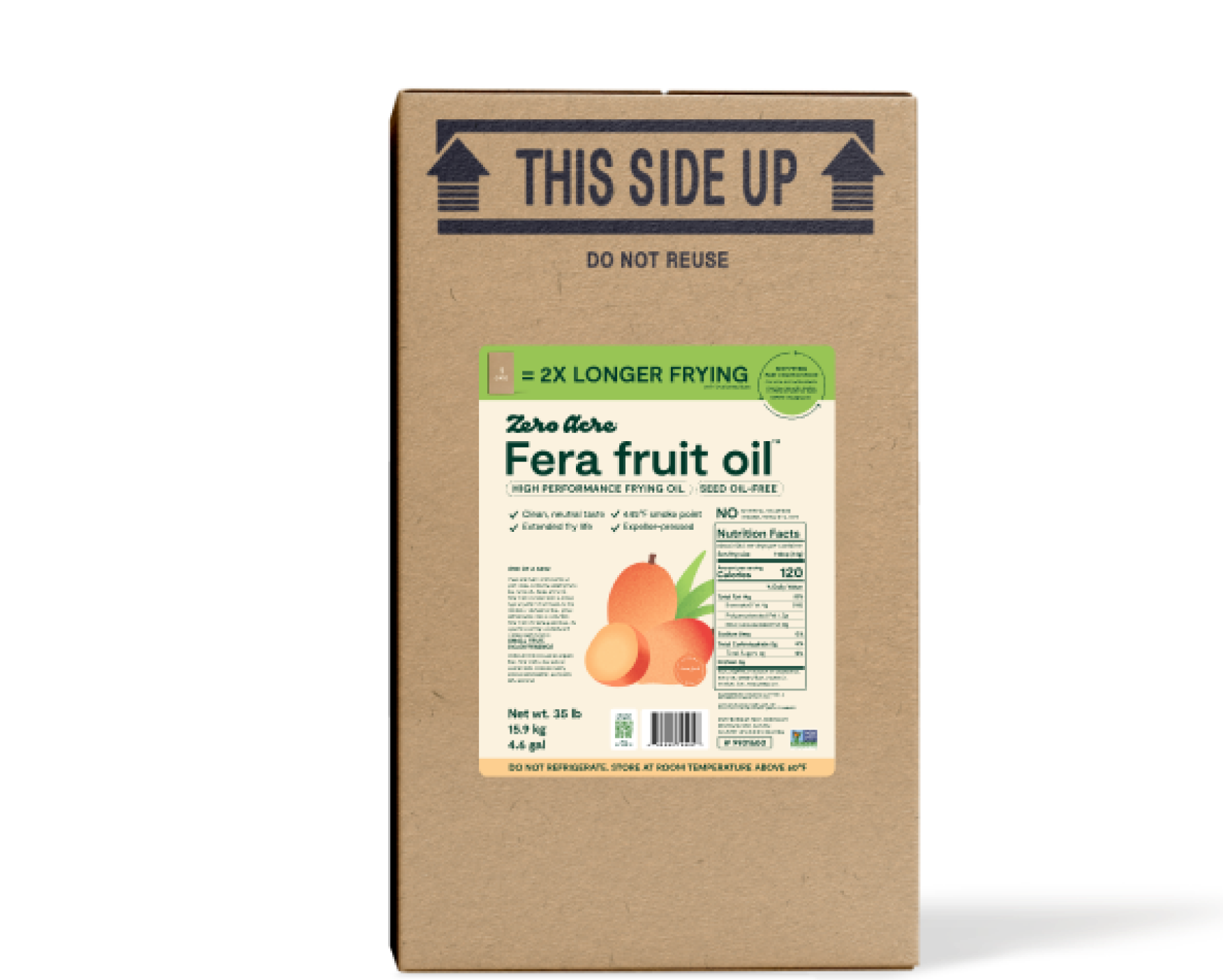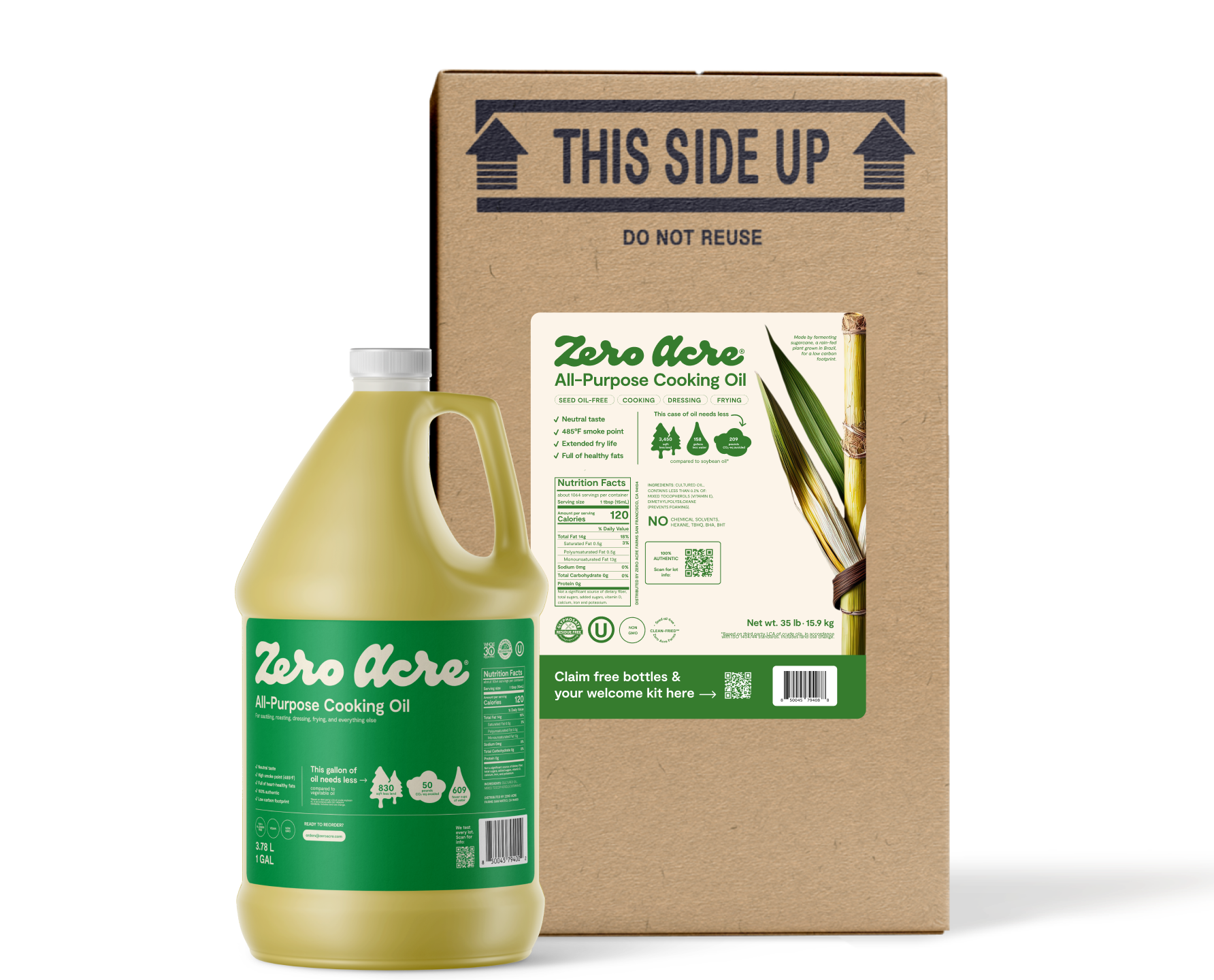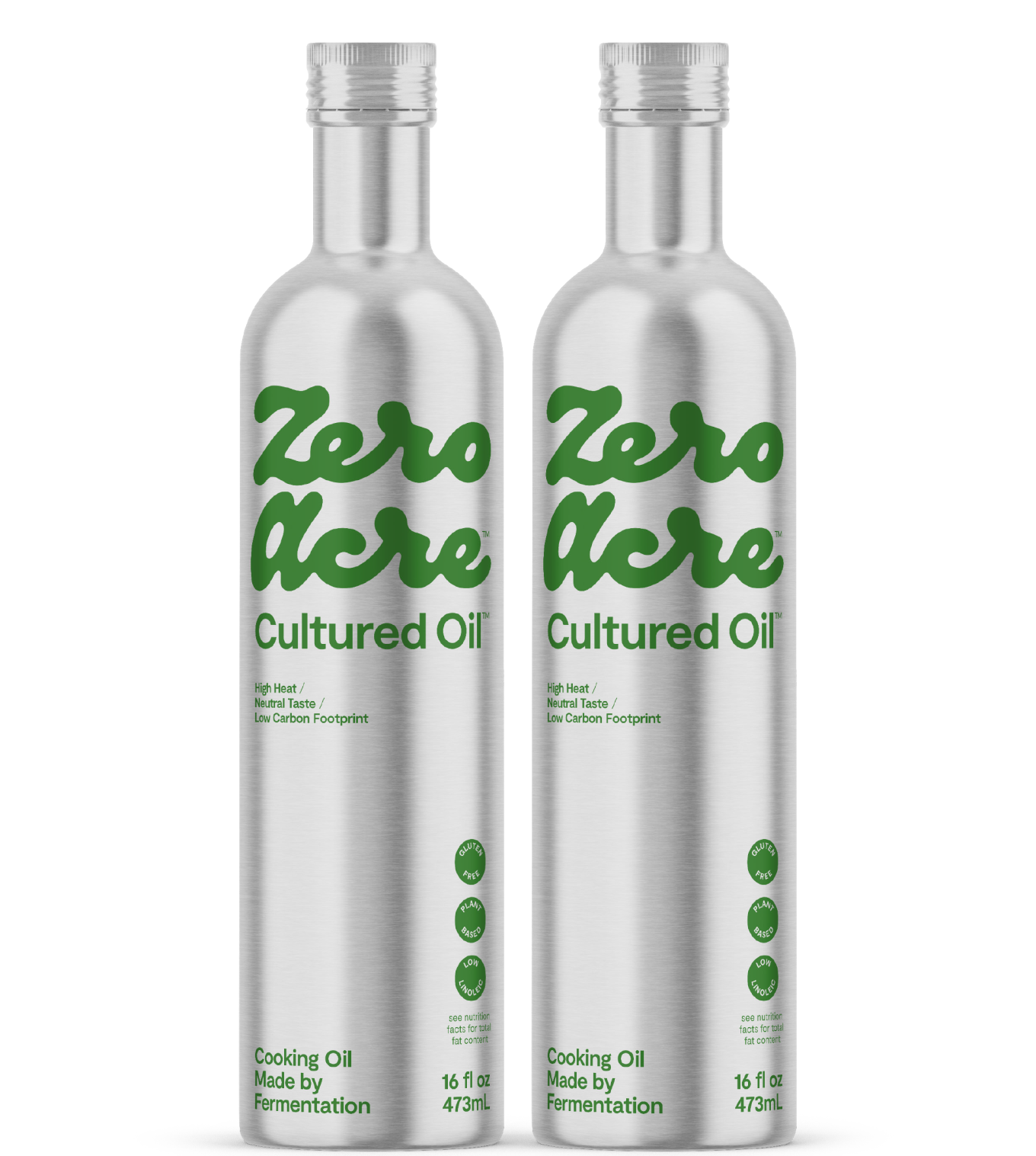WRITTEN BY: Corey Nelson
Article at a Glance
Most people overlook the environmental impact of cooking oils, which is significant.
The biggest problems with cooking oils include land use, deforestation, chemical runoff, pollution, and emissions.
Each oil has its own unique environmental tradeoffs. For example, palm oil is extremely efficient but results in major deforestation, while sunflower oil has a low carbon footprint but uses a lot of water.
By making careful, well-educated purchasing decisions, you can vote with your dollar to make an immediate impact and also help reform the food system over time.
Introduction
If you look on the back of most packaged foods, or ask how your latest restaurant meal is cooked, it’s likely you’ll find the same thing: vegetable oils. Vegetable oils are everywhere and producing cooking oil is a huge global industry.
Like any big business, it's industrialized, commodified, and optimized for profit — sometimes at the expense of the environment and sustainability.
In this guide, we'll show you how different cooking oils affect the environment, the factors that make them sustainable (or not), and how you can make better choices that make a real difference.
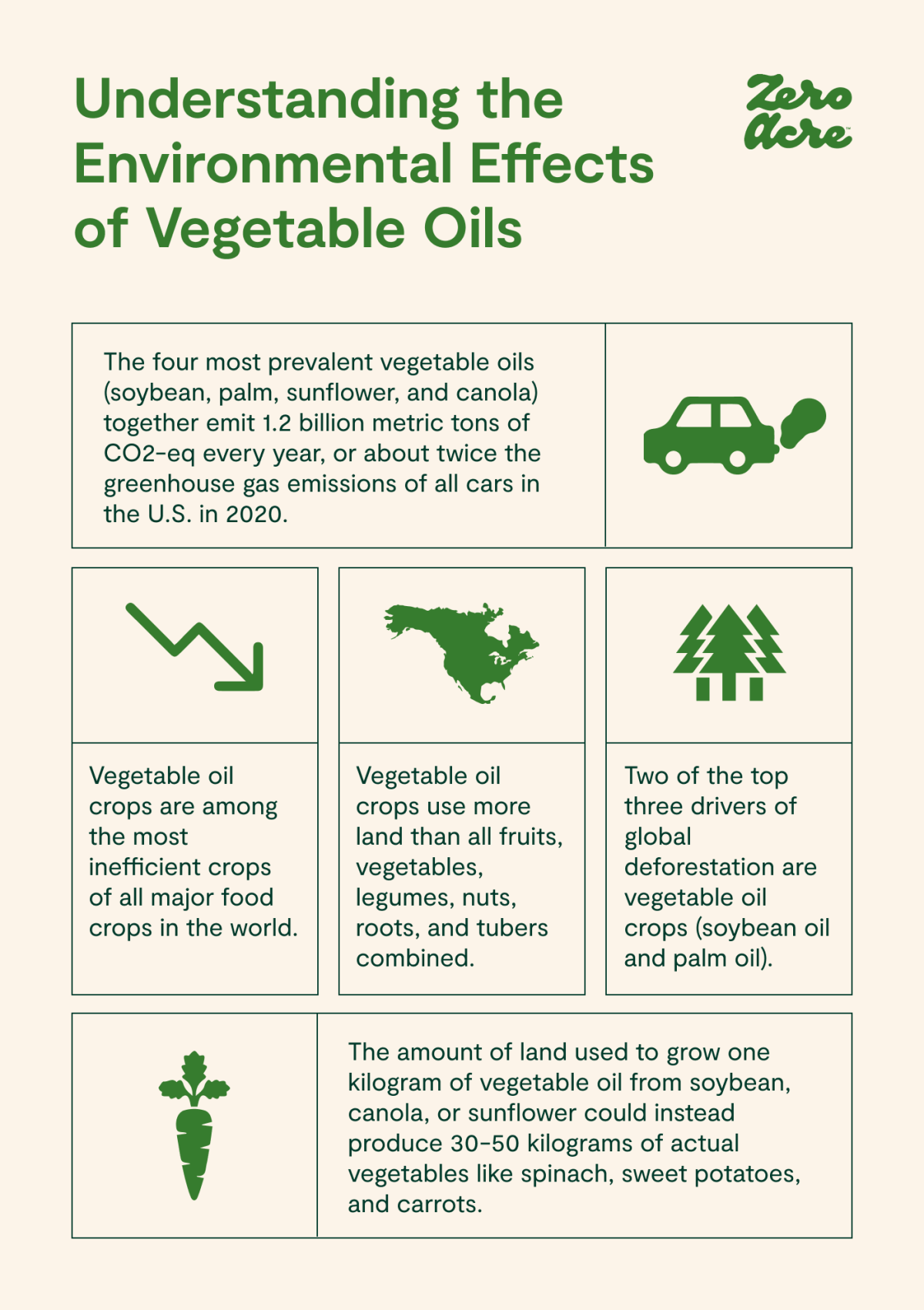
What Makes Cooking Oil Environmentally Friendly?
Cooking oils are essential commodities. Most of us use them daily, yet it's easy to forget how many different steps those conveniently bottled, transparent liquids undergo before they reach your kitchen.
For the most part, environmentally-friendly cooking oils are the oils that minimize adverse environmental effects at each point of production and distribution, from the land where the crops grow to water use to importing. The environmental impact of each type of cooking oil varies based on each of these factors.
Here's how oils go from the crop stage to your kitchen:

While each step in cooking oil production can potentially result in negative environmental consequences, these are also opportunities to reduce environmental impacts.
How Sustainable Are Common Cooking Oils?
Here's how most cooking oils compare in terms of land use, ecosystem impact, water footprint, pollution, emissions, and energy usage.
Avocado Oil
Avocado oil is a versatile, high-heat cooking oil that's high in heart-healthy monounsaturated fats, but current avocado production has some serious sustainability problems.
A single avocado requires over 60 gallons of water to produce, and intensive avocado farming in Mexico is now leading to erosion and loss of forest habitats [*,*]. Now, consider that it can take 10 pounds of avocados to produce a standard 16.9oz bottle of avocado oil [*].
Avocados are also associated with higher CO2 emissions than many crops, especially since they often travel significant distances from where they're grown [*].
When possible, buying avocado oil that's organic, fair-trade, and produced in regions near where you live may help mitigate these issues.
Canola Oil
Canola (rapeseed) is among the most efficient oil crops in terms of water use, and it's also got a favorable yield of cooking oil [*]. Around 45% of the canola seed consists of oil (fat), which is double that of soybeans [*].
However, canola oil production does have environmental issues, including significant land use, pesticide usage (which appear to be affecting wild bee populations), and the use of large amounts of fertilizers and other chemicals [*,*,*].
Most commercial canola oil is extracted using hexane, an industrial solvent associated with toxicity and air pollution [*].
You can avoid some of these issues by buying organic, expeller-pressed canola oil.
Coconut Oil
As a tropical crop, coconuts grow in the most biodiverse regions of the planet, in the tropics near the equator. And unfortunately, coconut oil production has a significant negative impact on biodiversity.
Even though the overall production of coconut oil is relatively small compared to other cooking oils, it threatens more species per ton of oil produced than any other cooking oil.
According to a study from the University of Exeter, deforestation from coconut oil production affects 20 threatened plant and animal species per million liters of oil produced (compared to olive oil, 4.1 species per million liters, and palm oil, 3.8 species) [*,*].
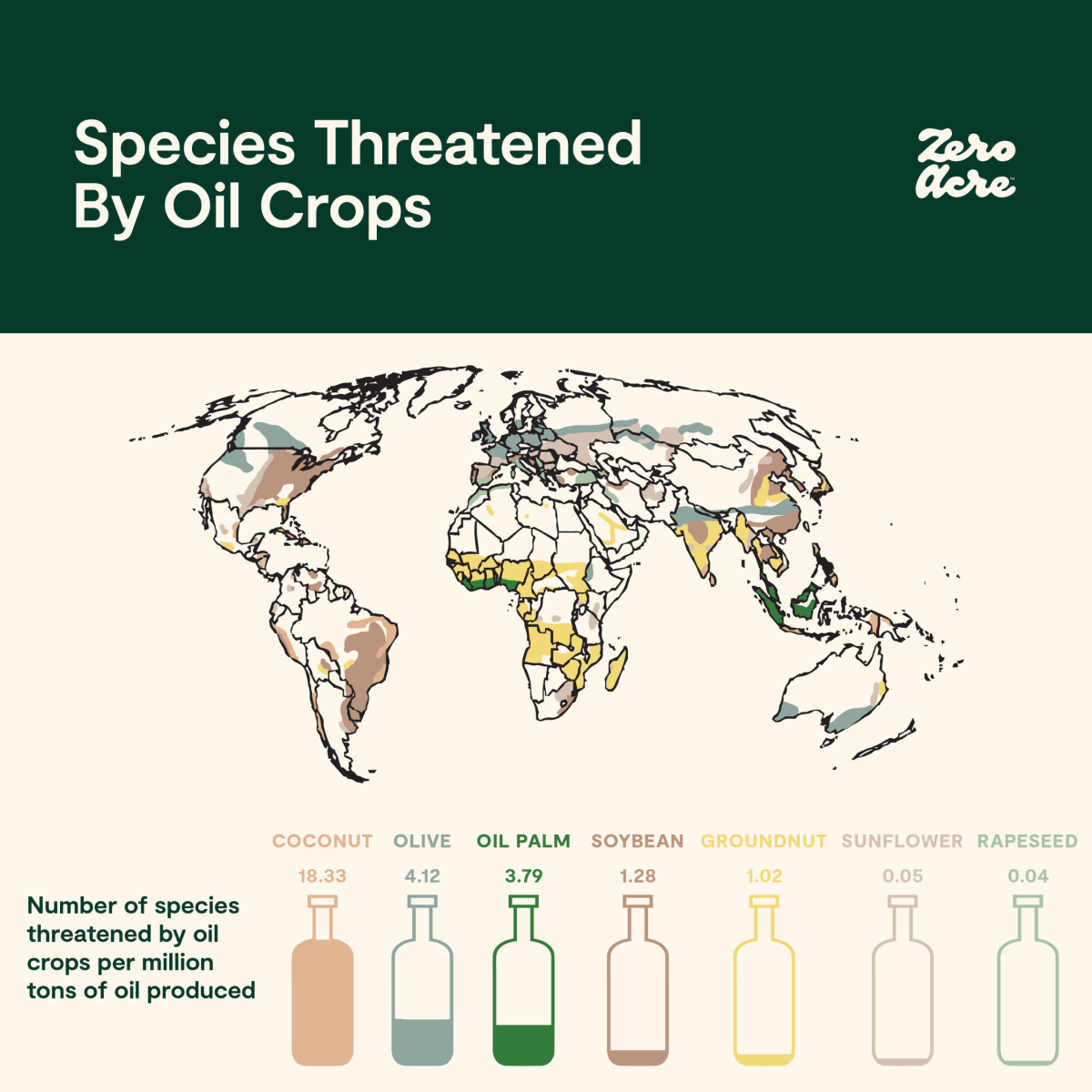
You can offset some of the harm of coconut oil production by buying Rainforest Alliance Certified coconut oil [*].
Corn Oil
Corn is the single biggest agricultural commodity produced in the United States, and it's not considered very sustainable [*].
The vast majority of corn is grown in monocultures that rely heavily on nitrogen, herbicides, pesticides, and industrial farming equipment.
There are plenty of better cooking oil options than corn oil, from a health and a sustainability standpoint, so you might as well skip this option altogether.
Zero Acre Oil
Zero Acre oil is a new type of oil made through fermentation. It was introduced as a viable solution to the environmental problems posed by conventional cooking oils, and it's high in heart-healthy monounsaturated fats and low in inflammatory linoleic acid.
Unlike vegetable oil crops, Zero Acre oil can be produced anywhere in the world and therefore results in zero tropical deforestation, with minimal impact on biodiversity.
Furthermore, the sugars used to feed the fermentation of Zero Acre oil are never sourced from rainforest regions or equatorial zones (including previously deforested areas).
Before Zero Acre oil, palm oil was by far the most productive oil crop, producing 3.6 metric tons of oil per hectare of land. Zero Acre oil is as productive as palm oil when it comes to oil yield per acre, but without the negative impact on tropical ecosystems [*].
Compared to the most prevalent vegetable oil in the U.S. (soybean oil), Zero Acre oil emits 86% fewer greenhouse gasses, consumes 83% less water, and uses 90% less land [*].
And compared to other common vegetable oils like canola oil, sunflower oil, and olive oil, Zero Acre oil requires 86-94% less land.
No other oil comes close to Zero Acre oil’s small environmental footprint and total impact on biodiversity, land use, greenhouse gas emissions, and water consumption.
Zero Acre oil also comes in a 100% recyclable BPA-free aluminum bottle, offering a more sustainable option than plastic or glass [*].
Olive Oil
Olives are a thirsty crop that typically rely on freshwater irrigation to support oil yield. Without sufficient water, most olive trees produce a low yield, and also result in oil with bitter and unpleasant flavors [*].
Among all food crops, only nuts like almonds require more water than olive oil. In fact, olive oil requires more water per kilogram of food than even beef, eggs, pork, or milk [*].
On the positive side, olive trees are perennials (meaning they don't die off and require replanting each year), so they don't have the same degree of land use or deforestation issues as many other oil crops.
You can reduce the impact of buying olive oil by seeking out organic or pesticide-free olive oil from old-growth trees, which often come from Europe. Older olive trees require less watering and are generally more sustainable.
Just be sure to read the bottles to ensure that your olive oil is coming from a reputable source. Many olive oils are adulterated with cheaper seed oils like soy and canola.
Palm Oil
Palm oil is by far the most prevalent cooking oil in the world — and its reputation for being environmentally unfriendly is at least partially deserved.
Three years ago, annual global palm oil production reached 72 million tons, which accounts for about a third of all cooking oils produced worldwide each year [*].
Like coconuts, oil palms are a tropical crop. The majority of palm oil comes from Indonesia (57%) and Malaysia (27%) [*]. As with coconut oil, the production of palm oil affects tropical regions with high biodiversity.
According to the International Union for Conservation of Nature, oil palm expansion has significant negative effects on global biodiversity and affects at least 193 threatened species [*].
The adverse environmental effects of palm oil aren't inevitable, but are mainly a result of disregard for ethical land management practices. Another, related reason is the growing demand for palm oil without consumer awareness over environmental impact.
On the positive side, palm oil is the most efficient traditional oil crop, producing 4 times more oil per hectare than sunflowers, over 6 times more oil than soybeans, and 11 times more than olives [*].
The best way to avoid the environmental impacts of palm oil is to look for an environmentally certified product like Sustainable Palm Oil, certified by the Roundtable on Sustainable Palm oil (RSPO), or with a certified fair trade logo on the label (FairPalm, Fair for Life, or other organizations).
Peanut Oil
On the whole, peanuts and peanut oil are refreshingly sustainable and environmentally friendly.
As legumes, peanuts are nitrogen-fixing with the ability to restore depleted soils, and their deep roots (reaching over two meters into the soil) reduce the need for freshwater irrigation [*].
The main downside of peanut oil is its relatively high omega-6 linoleic acid content, which is harmful for health when consumed in excess.
It's easy to eat too much linoleic acid when you cook with seed oils, so it's probably wise to limit your peanut consumption to snacking on whole peanuts and natural peanut butter, not peanut oil. Peanuts use 17 times less water compared to almonds, so you can feel good about them as an occasional snack.
Sunflower Oil
Sunflower oil has a relatively low carbon footprint and typically uses lower amounts of herbicides than other oil crops (sunflowers are allelopathic, meaning they naturally kill off competing plants, like weeds) [*].
However, sunflowers use a relatively large amount of water (but still only half as much as olive oil, on average) and are often produced using destructive pesticides [*,*].
In addition to its environmental impact, sunflower oil tends to contain higher levels of inflammatory linoleic acid than most other vegetable oils.
Soybean Oil
Soybean crops are a major cause of deforestation, loss of natural habitats, displacement of small farmers and indigenous peoples, soil erosion and degradation, chemical runoff, and excessive water use [*].
As a legume, soybeans have the potential to restore nitrogen levels in depleted soils, but only as part of responsible land management and regenerative agriculture.
Currently, the most sustainable choice is to avoid soybean oil when possible in favor of more environmentally-friendly cooking oils.
The Takeaway
If you're serious about sustainability, it's time to vote with your dollar and make the right choices when you're shopping for cooking oils.
The good news is that you can consume avocado oil, coconut oil, olive oil, and palm oil in a more environmentally responsible manner. Look for the appropriate certifications and guarantees from credible organizations when you shop for these oils.
Canola, peanut, sunflower, and soybean oil are best to avoid when possible. Each of these seed oils may require you to make compromises on your values surrounding sustainability, health, or both.
The bottom line is that all cooking oils derived from conventional oil crops require you to make compromises.
On the other hand, Zero Acre oil, which is made by fermentation, avoids many of the environmental issues associated with oil crop agriculture.
It's a better choice in terms of its land use, water use, emissions, and other criteria we've covered in this article — not to mention its high levels of heart-healthy fats and unmatched culinary performance.
When it comes to choosing more sustainable food options, it’s tough to strive for perfection, but small changes really do make an enormous difference over time.

